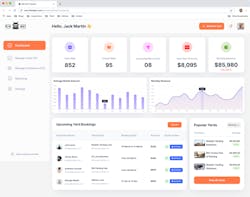A truck parking shortage has long been a problem for the industry, with drivers listing it as their No. 1 pain point three years in a row, leading industry startup Rig Hut to offer on-demand parking booking and management.
With over 3,000 spaces already available from truck parking facilities, as well as outdoor storage companies and other businesses offering unutilized space, Rig Hut is prepared to meet the demand of drivers looking for safe, affordable, easily bookable parking, co-founder and CEO Jake Guso told FleetOwner.
See also: Heller: Don't assume Congress understands truck parking
Before building Rig Hut's online marketplace and management tools, co-founders Jake Guso and Jose Lorido built a small company to help manage third parties' truck parking facilities.
"We realized that there were really no tools available to effectively run them and optimize space so that's how we came up with the idea for Rig Hut, this full-service technology solution for truck parking operators, drivers, and carriers," Guso told FleetOwner.
Property managers can upload the real estate they wish to rent out to drivers, who themselves can use Rig Hut's online marketplace to browse and book parking and communicate with that parking proprietor.
Although Rig Hut was launched last year, Guso and Lorido, after seeing a need for better parking management tools, launched the company's current management software in July with funding from real estate investor Rizk Ventures. The tools allow users to manage capacity, payments, and what equipment types the spaces can handle, whether tractor-trailer, just a tractor, trailer only, or smaller commercial vehicles such as vans and box trucks.
See also: FMCSA to award grant funding for truck parking, CDL training
Rig Hut can integrate its reservation system into a property's existing smart gate programs, allowing for fully automated functionality in which drivers can enter a property without meeting with property managers face-to-face. However, the company is also working on hardware that can be affixed to gates to enable access control capabilities between managers and drivers, Guso told FleetOwner.





